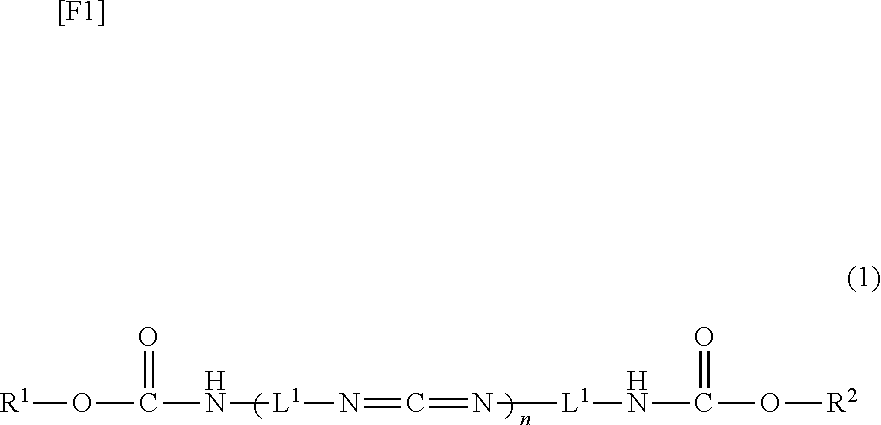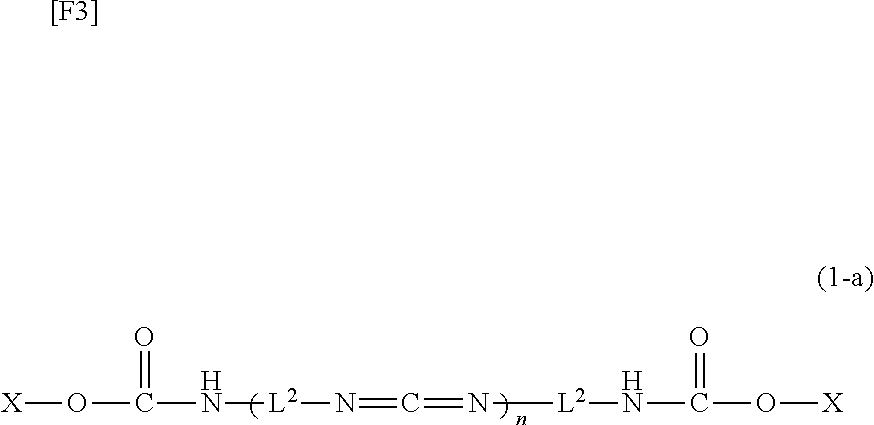Carbodiimide compound, carbodiimide composition and aqueous coating composition
a technology of carbodiimide and compound, which is applied in the preparation of isocyanic acid derivatives, organic chemistry, coatings, etc., can solve the problems of water resistance and durability of the coating film, difficulty in handling external cross-linking agents, and impaired strength, so as to improve the water resistance, solvent resistance and adhesion of the resin composition, and improve the water solubility. , the effect of high water solubility
- Summary
- Abstract
- Description
- Claims
- Application Information
AI Technical Summary
Benefits of technology
Problems solved by technology
Method used
Image
Examples
synthesis example 1
Polymerization to Produce Isocyanate-terminated Carbodiimide
[0077]To a reactor (capacity: 3,000 mL) equipped with a reflux tube and a stirrer, 4,4′-dicyclohexylmethane diisocyanate (1,572 g) and a carbodiimidation catalyst (3-methyl-1-phenyl-2-phospholene 1-oxide) (7.86 g) were added. The mixture was stirred at 185° C. for 10 hours under a stream of nitrogen, to thereby yield isocyanate-terminated 4,4′-dicyclohexylmethanecarbodiimide (polymerization degree: 3). Through infrared absorption (IR) spectrometry, a peak attributed to a carbodiimide group near 2,150 cm−1 was detected. The NCO % was found to be 9.16%.
synthesis example 2
End-capping with Polyethylene Glycol Monomethyl Ether and Methyl Lactate
[0078]The isocyanate-terminated 4,4′-dicyclohexylmethanecarbodiimide (polymerization degree: 3) produced in Synthesis Example 1 (51.8 g) was melted at 120° C., and polyethylene glycol monomethyl ether (average molecular weight: 400) (13.6 g) and methyl lactate (8.2 g) were added to the melt. The mixture was heated to 150° C. and allowed to react for five hours under stirring. Disappearance of the peak attributed to an isocyanate group 2,200 to 2,300 cm−1 was confirmed through infrared absorption (IR) spectrometry, and the mixture was cooled to about 80° C. Water was added to the cooled mixture, to thereby yield a pale yellow, transparent carbodiimide solution having a solid content of 40 mass %. Through GPC measurement, the average molecular weight (polystyrene standard) was found to be 1,500.
synthesis example 3
End-capping with Polyethylene Glycol Monomethyl Ether and Methyl Glycolate
[0079]The isocyanate-terminated 4,4′-dicyclohexylmethanecarbodiimide (polymerization degree: 3) produced in Synthesis Example 1 (51.8 g) was melted at 120° C., and polyethylene glycol monomethyl ether (average molecular weight: 400) (13.6 g) and methyl glycolate (7.1 g) were added to the melt. The mixture was heated to 150° C. and allowed to react for five hours under stirring. Disappearance of the peak attributed to an isocyanate group 2,200 to 2,300 cm−1 was confirmed through infrared absorption (IR) spectrometry, and the mixture was cooled to about 80° C. Water was added to the cooled mixture, to thereby yield a pale yellow, transparent carbodiimide solution having a solid content of 40 mass %. Through GPC measurement, the average molecular weight (polystyrene standard) was found to be 1,500.
PUM
| Property | Measurement | Unit |
|---|---|---|
| thickness | aaaaa | aaaaa |
| thickness | aaaaa | aaaaa |
| mole ratio | aaaaa | aaaaa |
Abstract
Description
Claims
Application Information
 Login to View More
Login to View More - R&D
- Intellectual Property
- Life Sciences
- Materials
- Tech Scout
- Unparalleled Data Quality
- Higher Quality Content
- 60% Fewer Hallucinations
Browse by: Latest US Patents, China's latest patents, Technical Efficacy Thesaurus, Application Domain, Technology Topic, Popular Technical Reports.
© 2025 PatSnap. All rights reserved.Legal|Privacy policy|Modern Slavery Act Transparency Statement|Sitemap|About US| Contact US: help@patsnap.com



